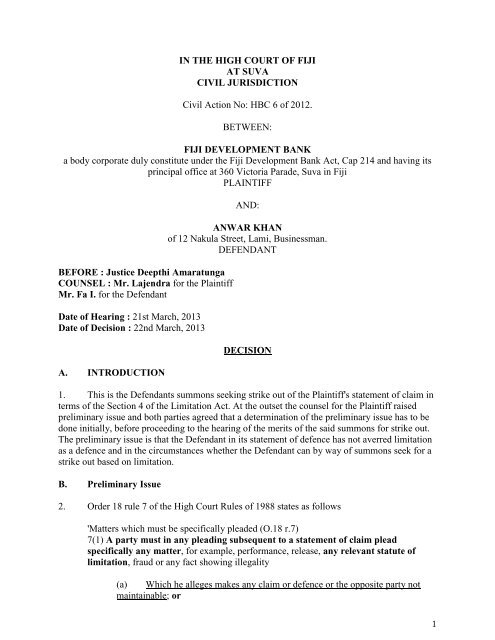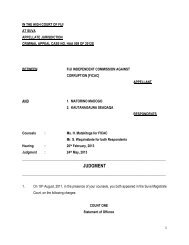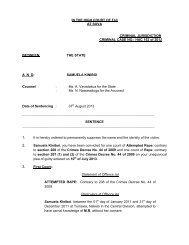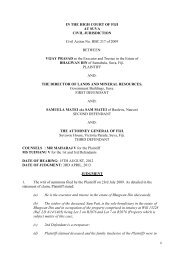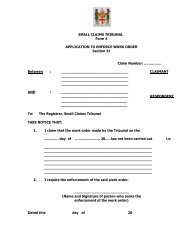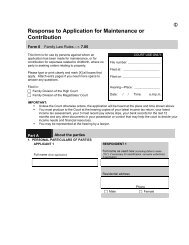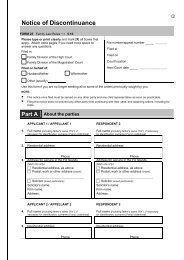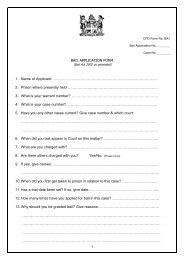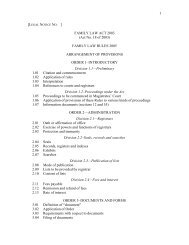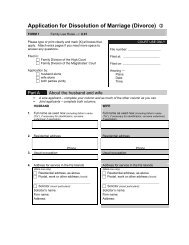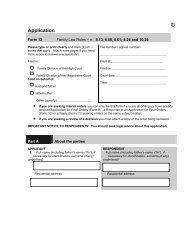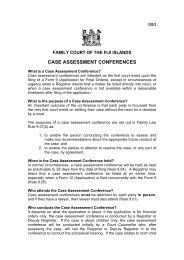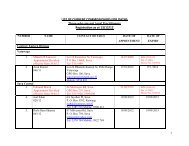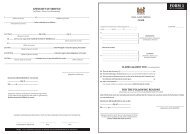FIJI DEVELOPMENT BANK a body corpo - Judiciary Fiji
FIJI DEVELOPMENT BANK a body corpo - Judiciary Fiji
FIJI DEVELOPMENT BANK a body corpo - Judiciary Fiji
You also want an ePaper? Increase the reach of your titles
YUMPU automatically turns print PDFs into web optimized ePapers that Google loves.
IN THE HIGH COURT OF <strong>FIJI</strong>AT SUVACIVIL JURISDICTIONCivil Action No: HBC 6 of 2012.BETWEEN:<strong>FIJI</strong> <strong>DEVELOPMENT</strong> <strong>BANK</strong>a <strong>body</strong> <strong>corpo</strong>rate duly constitute under the <strong>Fiji</strong> Development Bank Act, Cap 214 and having itsprincipal office at 360 Victoria Parade, Suva in <strong>Fiji</strong>PLAINTIFFBEFORE : Justice Deepthi AmaratungaCOUNSEL : Mr. Lajendra for the PlaintiffMr. Fa I. for the DefendantDate of Hearing : 21st March, 2013Date of Decision : 22nd March, 2013A. INTRODUCTIONAND:ANWAR KHANof 12 Nakula Street, Lami, Businessman.DEFENDANTDECISION1. This is the Defendants summons seeking strike out of the Plaintiff's statement of claim interms of the Section 4 of the Limitation Act. At the outset the counsel for the Plaintiff raisedpreliminary issue and both parties agreed that a determination of the preliminary issue has to bedone initially, before proceeding to the hearing of the merits of the said summons for strike out.The preliminary issue is that the Defendant in its statement of defence has not averred limitationas a defence and in the circumstances whether the Defendant can by way of summons seek for astrike out based on limitation.B. Preliminary Issue2. Order 18 rule 7 of the High Court Rules of 1988 states as follows'Matters which must be specifically pleaded (O.18 r.7)7(1) A party must in any pleading subsequent to a statement of claim pleadspecifically any matter, for example, performance, release, any relevant statute oflimitation, fraud or any fact showing illegality(a) Which he alleges makes any claim or defence or the opposite party notmaintainable; or1
(b)or(c)Which, if not specifically plead, might take the opposite party by surprise;Which raises issues of fact not arising out of the preceding pleading.(2) Without prejudice to paragraph(1), a defendant to an action for the recovery of landmust plead specifically every ground of defence on which he relies, and a plea that he isin possession of the land by himself or his tenant is not sufficient.(3) A claim for exemplary damages must be specifically pleaded together with the factson which the party pleading relies.' (emphasis added)3. The plea regarding Limitation Act must be pleaded in any statement of defence since theDefendant is relying on the Section 4 of the Limitation Act for the dismissal of the Plaintiff'sclaim and whether it is mandatory or directory is the issue before me. The words in the Order 18rule 7(1) (a) are unambiguous and clear and in those circumstances the correct meaning of thewords should be given effect and in those circumstances the requirement to plead limitation if itis to be relied upon by a party is a mandatory requirement.4. The Defendant's contention for strike out in this summons is solely based on Order 18rule 7(1) (a) which deals with any allegation regarding the maintainability of the claim of thePlaintiff and the maintainability is questioned in this strike out based on the Section 4 of theLimitation Act, namely an action instituted outside the time period for Limitation Act. TheDefendant argues that they need not plead the defence in terms of Limitation Act, since thepurpose of the Order 18 rule 7(1) (a) is based on that a party should not be taken by surprise, andsince this is a summons based on limitation, sufficient notice is given, hence no requirement toinclude defence of limitation in the statement of defence.5. The issue of opposite party being taken by surprise will not arise since the requirementfor specific plea for the issue of limitation is required in terms of Order 18 rule 7(1)(a) and not interms of Order 18 rule 7(1)(b) which deals with the opposite party being taken by surprise. So,the issue of opposite party being taken by surprise is not the basis of the Order 18 rule 7(1) (a),as contended by the Defendant's counsel. Order 18 rule 7(1) (a) of the High Court Rules of 1988is a standalone mandatory requirement whether the opposite side is taken by surprise or not, andthe basis is not the element of surprise, in the said provision but the very basis of themaintainability of claim is at stake and the Plaintiff should be allowed to consider its pleadingsbefore it is closed by giving notice of such a serious contention in the statement of defence. Theargument of the counsel for the Plaintiff that the Defendant is not taken by surprise is irrelevantsince he is seeking strike out solely based non the Section 4 of the Limitation Act which fallsunder the Order 18 rule 7(1) (a) of the High Court Rules, which has to be read along with theOrder 18 rule 10 where a party is also given an opportunity to plead any point of law, in terms ofOrder 18 rule 10 of the High Court Rules. Recent decision of <strong>Fiji</strong> Court of Appeal decided on 8thFebruary 2013 Civil Appeal ABU 49 of 2011 Ali Hassan Khan Vs Livia Buanasolo and Prakashemphasised on requirement of Order 18 rule 7 (1)(a).6. The rationale is clear that a party who is claiming the Plaintiff's claim is not maintainablein terms of any provision of law has to specifically plead in the pleading so that the Plaintiff isinformed of the said issue early and may either seek amendment to the Pleading or otherwise.This will not only save costs but also save much of the valuable time for every one, whilegranting the Plaintiff an opportunity to amend its pleadings or to seek leave of the court for2
suitable amendment. It is also illogical to allow a summons for strike out, based on limitationwithout such being pleaded in the statement of defence since the court is required to make adetermination to strike out a stamen of claim which is not substantiated in the statement ofdefence. The counsel of the Defendant was unable to explain why the statement of defence didnot plead Limitation or sought to amend the statement of defence to include the defence oflimitation which is a mandatory requirement in terms of the Order 18 rule 7(1)(a).7. The law relating amendments are separately contained in the High Court Rules of 1988and I do not wish to discuss about it in this determination, but suffice to note that different ruleswill apply to amendments depending on the circumstance of the case where the amendment issought, and this is not the opportunity for such determination. The Defendant had not fulfilledthe mandatory requirement, contained in Order 18 rule 7 (1) (a) which is fatal for the presentsummons.8. An action is strike out as the last resort and if an amendment could rectify any deficiencythe court should allow the party to amend without striking out the pleadings. So, summons forstrike out is allowed when no amendment would cure the deficiency and the claim is doomed tofail. In order to determine a strike out the Plaintiff should be granted an opportunity to encounterthe serious allegation based on maintainability of the action in its pleadings before the courtmakes a determination and in this instance, since the statement of defence did not contain suchallegation based on Limitation no such opportunity was given to the Plaintiff and summons forstrike out based solely on Limitation cannot maintain and should be dismissed on the ground of itbeing premature, too.C. CONCLUSION9. The mandatory requirement contained in the Order 18 rule 7 (1) (a) cannot becircumvented by filing a separate summons to strike out based on the Section 4 of the LimitationAct. In order to maintain any plea for dismissal of the Plaintiff's claim, the issue is themaintainability of the Plaintiff's claim which is specifically covered in terms of the Order 18 rule7(1)(a) of the High Court Rules of 1988. The statement of Defence must contain a specific pleafor limitation to the effect that the Plaintiff cannot maintain this action and in the absence of sucha plea the summons for strike out solely on the basis of Section 4 of the Limitation Act cannot bemaintained and it should be dismissed in limine and the Plaintiff's preliminary objection issustained and the summons for strike out is dismissed. Considering the circumstances of the caseI will not award a cost.D. ORDERSa. The Defendant's summons seeking strike out of the Plaintiff's action is dismissed inlimine.b. No cost.Dated at Suva this 22nd day of March, 2013.………………………………………….Justice Deepthi AmaratungaHigh Court, Suva3


